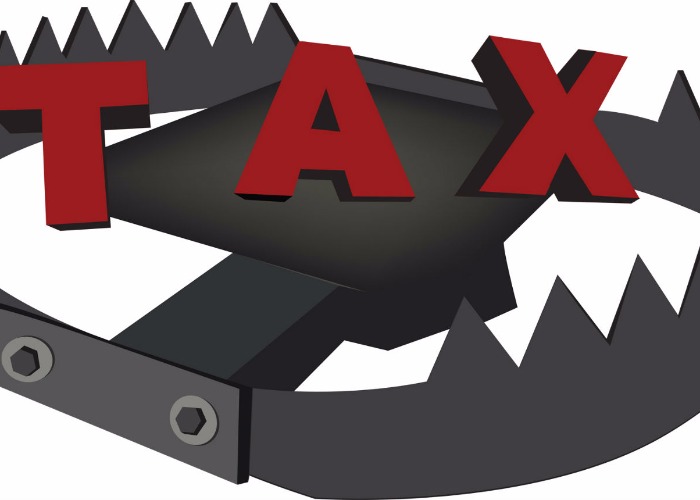Income Tax at 60%: how to legally cut your rate

Thanks to its complicated nature, almost a million people are paying 60% Income Tax – many without realising it. Work out if you are being stung and how to stop it.
This article is now out of date. Click here for our complete guide to tax saving – including Income Tax, Council Tax, Inheritance Tax and more – updated for the latest financial year.
A whopping 800,000 people are being caught in a hidden 60% Income Tax trap, and the number is rising.
The headline rates of Income Tax are 20%, 40% and 45%, but a quirk in the rules means someone earning more than £100,000 a year pays 60% on some of their income.
If you earn more than £100,000 you lose £1 of your Personal Allowance for every £2 you earn over £100,000. So, if you earn more than £123,000 you lose your entire £11,500 Personal Allowance (£23,000/2=£11,500).
This means someone earning £123,000 pays £42,500 a year in tax as they lose the Personal Allowance and, as a result, more of their income is taxed at the 40% higher rate, as shown below.
|
|
Income in this tax band |
Tax due |
|
Personal Allowance – 0% |
£0 |
£0 |
|
Basic Rate Income Tax – 20% |
£33,500 |
£6,700 |
|
Higher Rate Income Tax – 40% |
£89,500 |
£35,800 |
|
Total |
£123,000 |
£42,500 |
If the same person had earned £100,000 they would have paid significantly less tax, as they would have had their complete Personal Allowance.
|
|
Income in this tax band |
Tax due |
|
Personal Allowance – 0% |
£11,500 |
£0 |
|
Basic Rate Income Tax – 20% |
£33,500 |
£6,700 |
|
Higher Rate Income Tax – 40% |
£55,000 |
£22,000 |
|
Total |
£100,000 |
£28,700 |
The £23,000 this person earned over £100,000 is effectively taxed at a 60% rate as an extra £13,800 is taken in tax compared to someone earning £100,000.
“This tax band is rarely flagged up by the Government and political parties, yet it is one of the highest rates of tax we have in this country,” Tina Riches, partner at accountancy firm Smith & Williamson told The Telegraph.
“People don’t understand how it works or its effects because it's conveniently described as ‘losing your Personal Allowance’, which is very confusing.”
The number of people caught in the 60% tax trap is steadily rising with the Institute of Fiscal Studies estimating that 800,000 people will pay the 60% tax this year, up from 588,000 in 2010-11.
If that upward trend continues, more than a million people will pay 60% Income Tax on part of their earnings next year.
Compare savings and ISA rates with loveMONEY
It could get worse
In its manifesto, Labour pledged to lower the 45% additional rate Income Tax band from £150,000 to £80,000.
That would mean the people earning between £100,000 and £123,000 would pay tax at 67.5% on those earnings.
“If we were to take the total tax burden of both the employee and employer who is required to pay National Insurance contributions on providing this salary the combined rate becomes 73.2%, one of the highest rates of tax we have in this country,” says Graham Farquhar, employer solutions partner at RSM.
“We all believe in a fair tax system and perhaps it is time for the new Government to amend this confusing rule and come up with a solution which is fair, equitable and easy to understand.”
How to legally avoid the 60% tax
If you are caught in the 60% tax trap, there is a way to get around it without taking a pay cut. You just need to up your pension contributions.
Someone earning £123,000 who made a £18,400 net contribution to their pension would find themselves in a much more favourable tax position, according to EQ Investors.
The contribution would benefit from basic rate tax relief, increasing it to £23,000. This reduces your net income to £100,000 meaning you regain your entire Personal Allowance.
The person would then pay £9,200 less Income Tax and get £4,600 tax relief on the pension contribution. That is effectively 60% tax relief on the pension contribution.
Plus, when you fill out your tax return you can claim higher rate tax relief on the pension contribution.
Compare savings and ISA rates with loveMONEY
Read more:
Why checking you tax code could save you THOUSANDS
Inheritance Tax move that could slash your bill
Earn thousands tax-free each year: Dividend Allowance, Sharing Economy, Rent a Room and more
Comments
Be the first to comment
Do you want to comment on this article? You need to be signed in for this feature